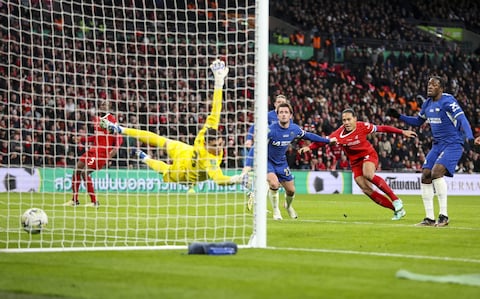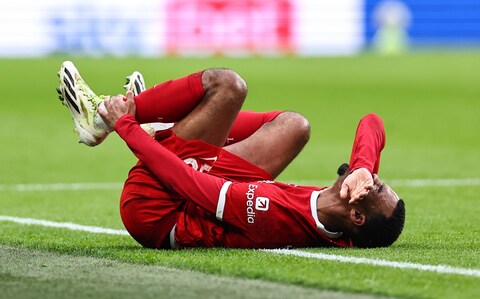Mr Hackett again creating headlines undermining referees, I believe most referees agree it was a missed caution & a correctly ruled offside goal.
The
Carabao Cup final was an entertaining match with plenty of incidents to discuss and Liverpool can feel aggrieved that the two pivotal decisions did not go their way.
The decision to rule out
Virgil van Dijk’s opener at Wembley was incredibly harsh. Wataru Endo should not have been flagged offside and was merely standing his ground with Levi Colwill.
It goes back to the inconsistency of decision making among the VAR and officials and until that is improved we are going to witness these flashpoints. This happens every week up and down the country, where holding offences go unpunished.
Wataru Endo stood his ground - space is not owned by anyone on a football field - and there was nowhere he could go. Where is he expected to stand? The law says that an offence occurs when a player in an offside position interferes with the movement of the opponent towards the ball but I am not sure Colwill was getting to Van Dijk and he appeared to run into the Liverpool midfielder just as much as Endo made contact with him.
I have always said that we should favour the attacking team in decision-making such as this one. We want to see matches full of goals but it feels sometimes we’re looking for excuses to disallow them which is a real shame.
Van Dijk heads past Petrovic CREDIT: Robin Jones/Getty Images)
You could tell that the moment referee Chris Kavanagh was called to the pitchside monitor, the goal was going to be disallowed. It’s so easy to rule out, then, when you’re called over – there’s very much a “to you, to me” element with this decision making and it gives the on-field ref an easy out when they can just say “OK, I will go with what you are saying to me.”
The law states: “If a player moving from, or standing in, an offside position is in the way of an opponent and interferes with the movement of the opponent towards the ball, this is an offside offence if it impacts on the ability of the opponent to play or challenge for the ball.”
But whether the law is being correctly applied every week is open to interpretation.
Liverpool’s sense of injustice does not stop there, however, and by the time Van Dijk scored they should have been playing 10 men anyway.
Moises Caicedo’s foul on Ryan Gravenberch in the first half was reckless and it endangered the safety of an opponent. Again, there’s plenty of inconsistency here: you saw on Saturday that Harry Maguire escaped a sending off for Manchester United but Billy Gilmour was dismissed for Brighton.
Gravenberch was hobbled by Caicedo who went completely unpunished CREDIT: Robbie Jay Barratt - AMA/Getty Images
Aside from the clear and obvious nature of the offence, it left Gravenberch needing a stretcher. These types of challenges need outlawing from the game.
Yes, it is a final and you want it to remain 11 vs 11 at all times, but it was a sending off offence. Chelsea got away with one there.





